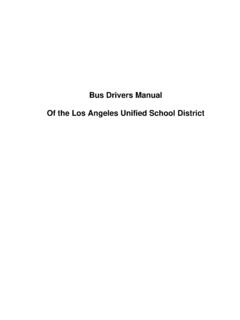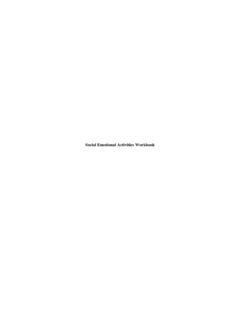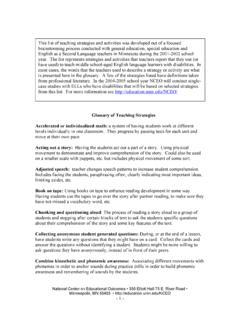Transcription of Teaching and Learning Framework - Los Angeles Unified ...
1 Released 6/2012 DRAFT SY 2012-2013 Human Resources Division Educator Development and Support July 2022 Teaching and Learning Framework Los Angeles Unified School District Classroom Teachers Focus Elements July 2022 EDST Focus Elements 1 PREFACE: LAUSD Teaching and Learning Framework The LAUSD Teaching and Learning Framework (TLF) describes clear expectations for effective Teaching , identifying highly effective practices to enable us to meet our goal to ensure all our students graduate ready for the world. LA Unified serves nearly 600,000 students from diverse cultural and linguistic backgrounds and with unique Learning needs.
2 The TLF highlights the research-based strategies that have been proven to be effective in meeting the needs of our culturally, linguistically, economically, and academically diverse learners. The TLF recognizes that students come from diverse cultural, linguistic, and ethnic backgrounds and possess a range of skills, abilities, interests, and levels of language proficiency that must be met through responsive, high-quality instruction. (LAUSD ) The TLF describes Teaching practices aligned with the instructional standards that will help to prepare all students to be successful and productive 21st Century learners who are college prepared and career ready.
3 The TLF also embeds the four LA Unified Social Emotional Learning (SEL) competencies to support the needs of the whole child . As the foundation for instructional practices in LA Unified , the TLF also acts as a guide for teachers to analyze, reflect upon and improve their practice independently, with colleagues, and/or with their administrator as part of the classroom teacher evaluation processes, Educator Development and Support: Teachers (EDST) and Non-classroom teacher evaluation (EDSNCT). The TLF, along with the School Counseling Framework (SCF), School Leadership Framework (SLF), Principal Supervisor Leadership Framework (PSLF), and the LA Unified Coaching Competencies, serve as guides for effective Teaching and leadership practice for all educational leaders in LA Unified .
4 EVIDENCE COLLECTION PROCESS To analyze Teaching practice, evidence of a teacher s practice is assessed using the Teaching and Learning Framework . Evidence is collected using a variety of methods including classroom observation (CO), professional conversations (PC), and artifacts (A). This diversified evidence collection process helps to ensure that teachers feedback, growth and development, and evaluation are informed by a variety of sources including students, administrators, and teachers themselves. Administrators are trained and certified to collect and analyze evidence using these strategies to ensure that evidence is appropriately aligned to the TLF, is representative of the teacher s practice, and is free of bias.
5 The evidence collection source for each element in the TLF is indicated by an abbreviation located below the name of each element. Classroom Observation (CO) COs are the cornerstone of EDST, providing an opportunity for teachers to demonstrate their instructional practice to receive feedback that will support their professional growth and development. COs include any classroom visits that take place as part of effective support practices in schools. Professional Conversation (PC) PCs include the Initial Planning Conference and Pre- and Post-Observation Conferences that are part of the EDST formal observation cycle and the observation of practice cycle in EDSNCT.
6 They can also include additional meetings where the teacher and administrator discuss evidence of the teacher s practice. Artifacts (A) Artifacts include samples of student work, lesson plans, unit plans, sample assessments, department meeting agendas, parent call logs, or any other type of documentation that provides evidence of a teacher s practice for a given element in the TLF. KEY TERMS Culturally and Linguistically Responsive Pedagogy Cultural and linguistic responsiveness means the validation and affirmation of indigenous (home) culture and language for the purpose of building and bridging the students to success in the culture of academia and in mainstream society (Hollie (2018), Culturally and Linguistically Responsive Teaching and Learning , 2nd Ed.)
7 , p. 27). 21st Century Skills S uper skills as identified in the Common Core State Standards Communication: Sharing thoughts, questions, ideas, and solutions Collaboration: Working together to reach a goal, putting talent, expertise, and intelligence to work Critical Thinking: Looking at problems in a new way, linking Learning across subjects and disciplines Creativity: Trying new approaches, innovating, and inventing LA Unified Social Emotional Learning (SEL) Competencies Growth Mindset: Belief that one s abilities can grow with effort Self-Efficacy.
8 Belief in one s own ability to succeed in achieving an outcome or reaching a goal Self-Management: Ability to regulate one s emotions, thoughts, and behaviors effectively in different situations Social Awareness: Ability to take the perspective of and empathize with others from diverse backgrounds and cultures, to understand social and ethical norms for behavior, and to recognize family, school, and community resources. July 2022 EDST Focus Elements LAUSD Teaching AND Learning Framework Focus Elements for Classroom Teachers (EDST) STANDARD 1: PLANNING AND PREPARATION STANDARD 2: CLASSROOM ENVIRONMENT a.
9 Demonstrating Knowledge of Content and Pedagogy 1. Knowledge of Content and the Structure of the Discipline 2. Knowledge of Content-Related Pedagogy b. Demonstrating Knowledge of Students 1. Awareness of Students Skills, Knowledge, and Language Proficiency 2. Knowledge of How Children, Adolescents, and Adults Learn 3. Knowledge of Students Special Needs 4. Knowledge of Students Interests and Cultural Heritage c. Establishing instructional Outcomes 1. Value, Sequence, Alignment, and Clarity 2. Suitability for Diverse Learners d. Designing Coherent Instruction 1.
10 Standards-Based Learning Activities 2. instructional Materials, Technology, and Resources 3. Purposeful instructional Groups 4. Lesson and Unit Structure e. Designing Student Assessment 1. Aligns with instructional Outcomes 2. Planning Assessment Criteria 3. Design of Formative Assessments 4. Analysis and Use of Assessment Data for Planning a. Creating an Environment of Respect and Rapport 1. Teacher Interaction with Students 2. Student Interactions with One Another 3. Academic Climate b. Establishing a Culture for Learning 1. Importance of the Content 2.












